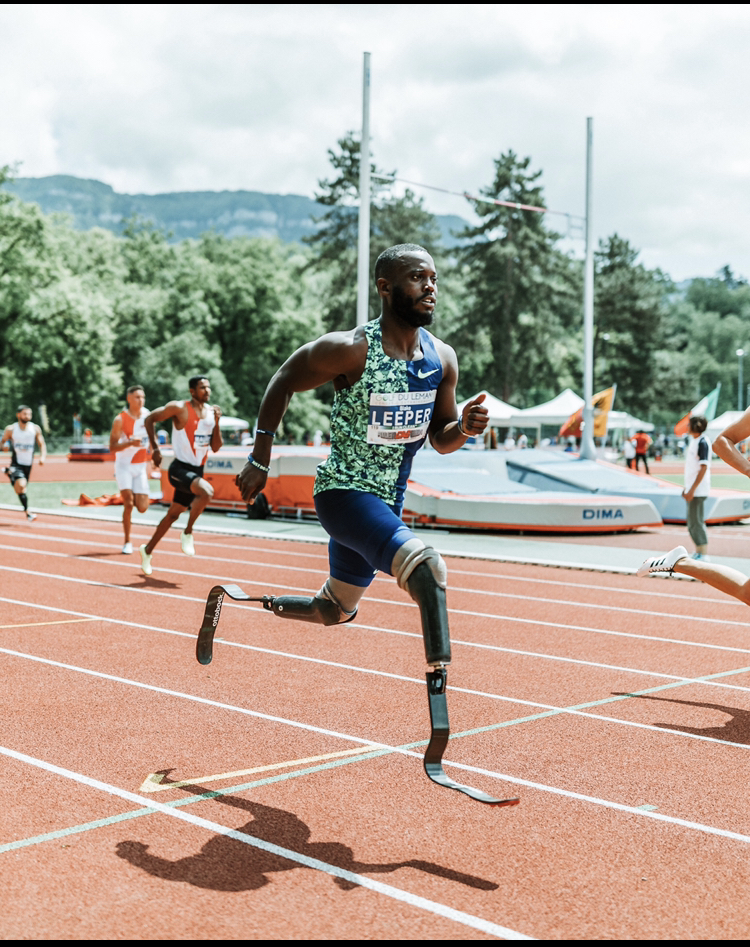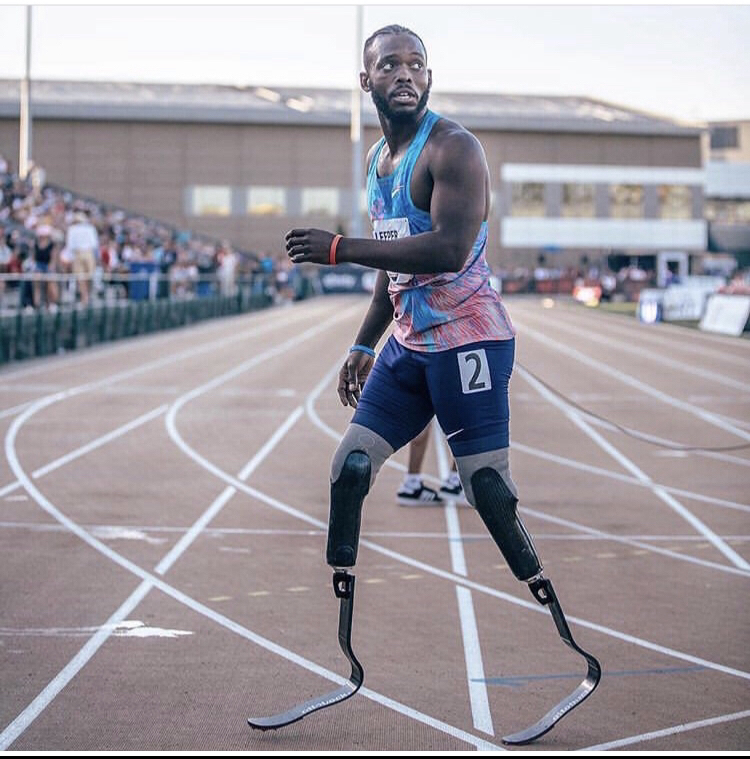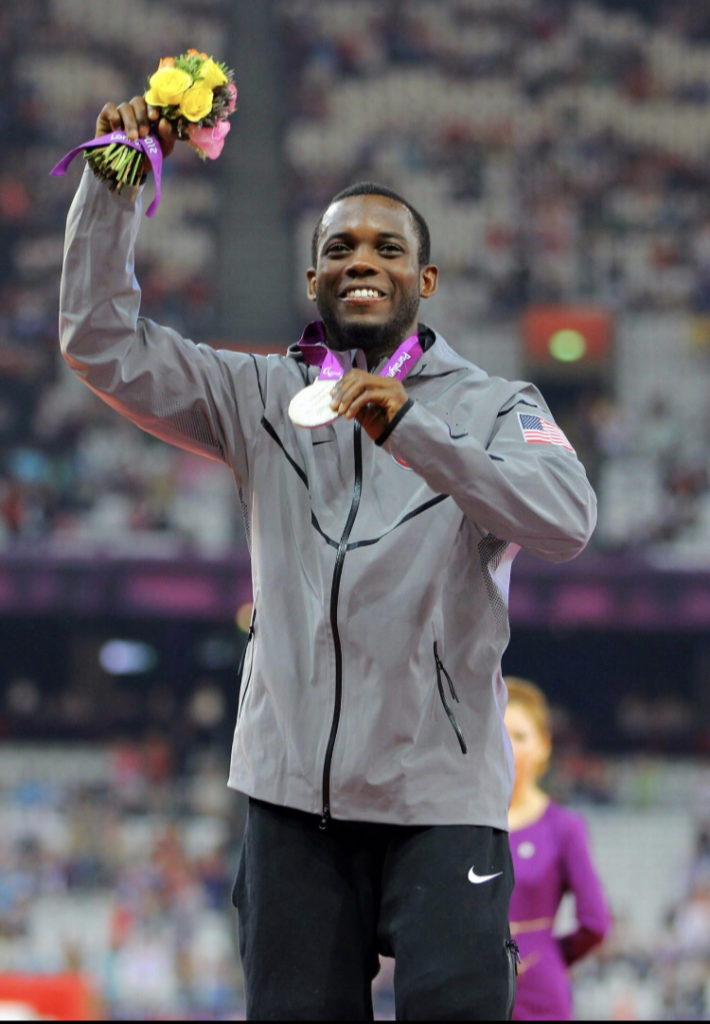WHO IS BLAKE LEEPER?
Blake Leeper is a man of immeasurable magnitude. Born with no legs to stand on, he was told by doctors that he would never walk a day in his life. Yet today, his stance is intentionally positioned and his strides are of greater postured intention than all of the humans I know. This superhuman powerhouse is now a silver and bronze medalist in the Paralympic Games, a world-record breaker — and is currently undergoing arduous training daily to qualify for the Olympics Games 2020. Yes, to compete against the world’s highest echelon able-bodied athletes in the greatest international sporting event in the world. He saunters through life with zero self-imposed limitations.
With intense discipline and focus, unquantifiable resilience and a community built on love, Blake Leeper shows to us that no dream is insurmountable.
In a recent People Are Awesome feature, Blake Leeper is quoted as saying, “The only disability in life is a bad attitude.” And he lives by every word of it. This man democratizes heroism for all of us. Men are ordinary. It’s the act that is extraordinary.
#LETLEEPERRUN
BLAKE LEEPER’S STORY
His story is nothing short of humbling, humanizing and remarkably inspiring. This man is not the guy who asks, “Why me?” He’s the guy who gives himself no excuse. He aims to serve as the light for those like him – those encountering differences in physicality and life adversities.
Clearly, Blake is a human embodying the definition of brains and brawn. When he was in college, he was on the pre-med track, readying himself to become an orthopedic surgeon so he could help people like himself. Then he caught wind of his first Paralympic Game when he was 18 years old and saw the potentialities of victory and athleticism — and the greater impact he could have to help others.
He qualified for the US Paralympic team on the first race he ever ran.
I am so blessed to have met him at the UCLA track where he trains so I could witness his sunny disposition and stamina up close and personal. He exemplifies how his physical and mental tenacity, love from his family and community and living life with purpose – has led him to where he is today. They were the weapons that gave rise to his glory days during the Paralympics Games, resurrected him when he fell (after testing positive for drug use) — and now set him on a path to set even more world records.
For those who meet him, they will see that the grass is always greener on Leeper’s side. He shows us how no dream is too big for him – or for us.
I am absolutely blessed to be granted this interview with the one and only.
Thank you for doing this interview. Everything you have been doing is awe-inspiring and exactly what we need in today’s day – so thank you.
I am blessed and feel so grateful to be in this position. I’m in a good place.
Disability is defined as a physical or mental condition that limits a person’s movements, senses, or activities. But for you, it has become your driving force. That hardly seems like a disability. What does it mean to be disabled to you?
And that is a really good question. That is a conversation that keeps coming up – especially in the situation that I am in now. If you want to label me as disabled – Yes, I do have a physical disability since I’m missing my legs. Am I considered disabled in the many rooms I find myself in where I am the fastest person in the crowd and one of the fastest men in the world? Is that disabled? It’s what the context comes with.
I’m trying to redefine the word — and I understand that some people have to label it. But really it’s just differently abled. I have challenges just as much as somebody else — but I do not put barriers on myself just because it’s different to you and something you’ve never seen before.
That’s the biggest point – because of my whole life, being born without legs, people have always tried to put me in this box. Saying, “If I was missing my legs – I could only do this or that.” So the bar was set kind of, not low, but very sympathetic to me.
What really got me to where I am is people pushing me through good tough love and expecting the best out of me.
We can be on the fastest, greatest trajectory of success. But that isn’t a story. It’s the resilience and perseverance…the humanizing of a person that makes a story. Most struggle with the comfort of complacency; you, on the other hand, are addicted to the win and the next endorphin kick. Please tell me about your Olympic Depression. You made bad decisions and tested positive for cocaine and were suspended from the track. Was this your biggest failure/fall/adversity that led to something positive?
It was real and something I really wasn’t prepared for in my life and my career. I just was on the journey of this goal of competing in the Paralympics. I dedicated and invested my whole life into it. And good, bad or indifferent – it is over after two weeks.
You train for two, three, four years and get ready for this one moment. I did really well – I got a silver and bronze – but after it comes and it goes, you lose your identity as an athlete of saying what’s next. And it’s a really scary feeling and you start searching.
And I started making bad decisions. I was achieving great things off the mat too, like doing celebrity events and living this lifestyle and not really understanding and trying to search for this happiness that I was missing after The Paralympic Games. I was drinking and doing drugs and hanging around the wrong people. And when it was time to get back into shape, that’s when I failed my drug test in 2015 at the trials.
When you deal with a failure in your life, you get to show the world how strong you truly are. When you deal with the trial and tribulations that happen, the tragedy in your life, you get to show the world how you truly fight to go to a place that is up!
Was it Ego or boredom?
Elaine – a little bit of both. A little about having the Ego and telling myself I’m doing all these great things, on the surface. I was still doing all of these interviews and I was still on TV but it was the boredom of self-sabotage. And when you put yourself out there, you’re very vulnerable. You give it everything you’ve got, day in and day out. It was a scary place to be.
When I say self-sabotage, instead of going to bed early, I would go out and hang out with people I shouldn’t have been hanging out with. Instead of going home, I would tell myself I could stay out later and show up late to practice.
And then when I failed my drug test and had to go public on the life I’d been living – that was my rock bottom. I lost my ability to race in the 2016 Paralympic Games. And I lost two years of competition. And one of the hardest parts is that in 2012, my grandmother came and watched me compete in the 2012 games and earn a silver and bronze medal. She had so much fun watching me compete in Europe for the first time, she was so excited about the next Paralympic Games. But I couldn’t go to RIO and compete. Unfortunately, she passed from cancer in 2016. And that weighs heavy in my heart.
And when you ask if it’s Ego or Boredom – I saw Ego in that respect.
What words did your Grandmother have for you?
My grandmother prayed for me when I couldn’t pray for myself. She fought for me when I couldn’t fight for myself. And I lost the sight of that. But once it was taken away, I had to rebuild myself back up. And that was one of the worst things that happened to me — but it’s also one of the best things that happened to me.
Even at that time, my grandma said, “Blake, I love you. Whatever God has planned for you will happen. His will, his way.”
We’re from East Tennessee. We’re very religious and Baptist — and I understand that everything happens for a reason. Good, bad or indifferent. I had to search for the meaning of this. And it was a wakeup call. I had to be thankful that I still had my life.
I lost sponsorships, I lost my sponsorships for my legs. So I had to literally duck tape old legs together just to make it to practice. It was an interesting period in my life — so that’s what I try and tell people: when you deal with a failure in your life, you get to show the world how strong you truly are. When you deal with the trial and tribulations that happen, the tragedy in your life, you get to show the world how you truly fight to go to a place that is up!
It put me in the right mental space, the right spiritual place.
Then I made the commitment that I really wanted to make the Olympic Games and I wanted to break Oscar Pistorius’ world record, I really wanted to be one of the fastest men in the world. And once I made that commitment, the miracles started happening and people started coming into my life and put me in a position where I really could potentially do this.
Then I broke Oscar’s record in 2017 and my own world record last year. My time last year put me at the 8th fastest runner in the world!
I am not a disabled athlete.
I know you’re aiming to qualify to be the first American amputee for the Olympic Games 2020. Can you touch upon what the obstacles are at the moment? And what are you aiming to communicate to the mass when you compete and if/when you win?
I could talk about so much right now.
With the time that I ran last year – I proved that I could qualify for the Olympics. And not just qualify – but potentially win a medal.
Being in that position was crazy — but once I got there, there was the hold up of what is fair and unfair with the blades that I’m running on. I’m trying to be the second amputee, but the first American, to qualify for the Olympic Games. I have fought hard – putting my blood, sweat and tears into it. And then to have the Federation say that I am at an unfair advantage is all very unfortunate.
I am trying to make history – so I understand that I’m doing something new. I am the first amputee under 45 seconds and that is new to them. And I totally understand that and respect that.
What I hope changes in the future is how they treat somebody like me, someone with a disability. And it’s unfortunate that they can’t look past this.
It goes back to our earlier conversation of what do they mean by disabled? What they’re trying to say is that because I am disabled, I shouldn’t be able to run this fast.
I wish they would look at me as a person, and at my training and how hard I have worked.
And then see me as an athlete that just so happens to have what they call a disability. I am not a disabled athlete. And that’s what I’ve been trying to get them to really look at. So I’ve been doing as much as possible. There’s data I have to show to get this resolved so I can compete in the 2020 Olympics.
The burden of proof, after Oscar Pistorius, switched from the Federation to the athlete. So I have to prove why I do not have an unfair advantage. I can’t share too many details but I’m doing the best to show the proof.
Hopefully, all eyes will be on this to support getting a fair chance.
Unfortunately, Pistorius went through what he went through after the Olympics; but during the Olympics – and especially when I was running with him during the Paralympics, the crowd and the number of people inspired by one man running a lap around the track showed the power of really giving it your all.
There are little kids out there, whether in America or Africa or China that have a disability and are being discriminated against – and that is not ok. I know that they’re treating me like this — so I can’t even imagine how they’re treating the rest of the world. It’s a form of injustice that has to be looked at. More needs to be done — and this is an important step in the right direction.
What lessons from training became tools for future success, on and off the track?
Especially in the past couple of years, the main lesson that I’ve learned is consistency. To really set a goal and really get something done is to commit and sacrifice. Once you understand that, then you fall in love with the process. Especially the hard times. You just need faith and commitment that you’re going to get better. Every day I get up and say, “I am going to walk.”
I am on a mission to achieve greatness and be one of the fastest men in the world. Then after I put that into the universe, I can’t take it back so I just keep showing up. You show up for your schedule.
Once you commit, you fall in love with getting better. Then miracles start happening.
Once you find your purpose and you accept it, you don’t feel like it’s work anymore. You feel like you wake up and you just happen to do what you’re doing. I am so to get up in the morning to run – especially since the told me I would never walk. I’m just grinning from ear to ear. I feel like I am meant to be doing this.
What is your training schedule?
We train year round, we take a week or two off. We go 4-5 days a week doing different types of workouts, at the beach or the park. And when we get close to the season, we crank it to almost every day to try and better myself. We do weight sessions in the afternoon. I have a chiropractor appointment twice a week to get adjusted since I am on relatively new technology. Because I am pushing barriers, we don’t have much information on how my body will react so I always have to get readjusted.
When will you know if you have achieved success? Is it The Olympics 2020, is it after the Olympics? Or have you already achieved success?
Having an Olympic medal and qualifying would be a good benchmark. Breaking world records would be an awesome benchmark for success. But success is tricky – you set one goal and then you achieve it. And then you set another. It’s like you’re always chasing. You never stop.
If you do, you can fall into an Olympic Depression or fall into a bad cycle. I’m getting to the place now where every day I feel like I have achieved success. The process is a success. The fact that I’m trying to qualify for the Olympics and they’re saying I have an unfair advantage – that is a success.
When a little kid has a similar disability as me and sees me and tells me that they’re rooting for me and that I inspired them to do better. That is a success. Success can come in different sizes and forms.
I just have to be open to receive them.
Once you find something that makes something happy, don’t put a price tag on it. Don’t think about how much money you’re going to make at it. If you fall in love with the process and what you’re doing – you don’t mind working overtime.
Have you thought about how you will proactively prevent Olympic Depression from invading again in the future?
I have so many tools and such a great lifestyle right now — and people surrounding me. My girlfriend, my family, my coach, my teammates. I’m in a good place to be prepared. Last time, especially in the culture I grew up in (a black male coming out of the South), we were taught to suppress our feelings and “be a man” – but the reality is that we’re humans and we cry and bleed and we should talk about our feelings and we should not be afraid to say I’m hurt.
We need to try and change that mindset.
We need to stay focused on the fact that our mission is not done when I enter the Olympics or win in the Olympics or break a world record. Being in a position where I am on TV now, my mission is never done. I have a continual mission to spread hope.
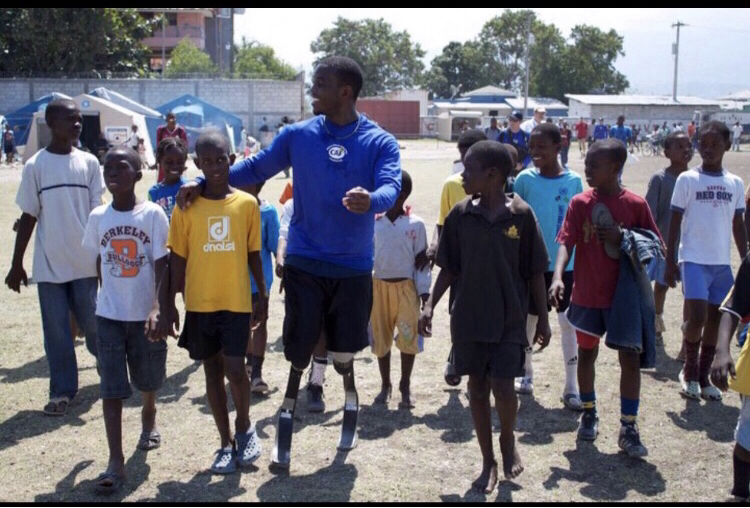
If your gut is telling you that might be good at something, try it.
Your mission is clear. How would you help others understand what their mission is?
I always encourage everyone to try new things. If your gut is telling you that might be good at something, try it. I didn’t start running until I was 18 years old. I played basketball and baseball and was an athlete. But I wasn’t a sprinter until I was 18. I believed in the dream that I could potentially be good at that.
Once you find something that makes something happy, don’t put a price tag on it. Don’t think about how much money you’re going to make at it. If you fall in love with the process and what you’re doing – you don’t mind working overtime. So you will always make money from it. Just keep grinding and be the best you can be at that.
You mentioned your girlfriend. Do you want to have a family; and if so, what is the one thing you’d want to pass down to your lineage…to teach your son, daughter, wife, grandchildren?
I do want to take that next step in our lives. To have the family and have that lineage. The mindset I want to give my kids is to tell them to shoot for the stars and never have limitations. Do it as long as it makes them happy.
My main rule is to not be a mean person. I know they will make mistakes but I just don’t want them to be mean people. I want them to be nice. They can take risks as long as it comes from a good place and has good intentions. That is the foundation that I want them to live by.
Growing up as a teen, I was a knucklehead and did stupid things. But in today’s day, with social media and all of these platforms of gaining information, it will be a different world.
Treat people like you’d want to be treated. If anyone is down and out and need your help, make sure to give help. I’m a true believer in Karma.
If you were to go to heaven and God asked you, What is the one wish you want before you enter? What would it be?
I would want my family and friends to be happy. I’m a true believer, that once you’re in heaven, you are no longer suffering. So I would just want my family and friends who have supported me to be happy. I would want all those still on earth fighting the trials and tribulations to find peace.
Tough love really saved my life. Having people in my life pushing me and not accepting mediocrity saved my life.
Who sacrificed the most for you? You mentioned your father, your grandmother – did your mother as well?
Yes, my mother. It was a whole group. My mother, my father, my grandmother, my brother, my girlfriend. My family stuck around me. They knew they were dealt with a situation. But they never brought up the fact that I’m missing my legs. They don’t see me like that. They knew if they would bring up the word that I’m missing something, that would bring up limitations. So they only pushed me.
Especially my mom. The days when my legs were swollen and I couldn’t put my legs on, my mom never said I could sit out and not go to school. She told me I had to put my legs on and figure this out. Tough love really saved my life. Having people in my life pushing me and not accepting mediocrity saved my life.
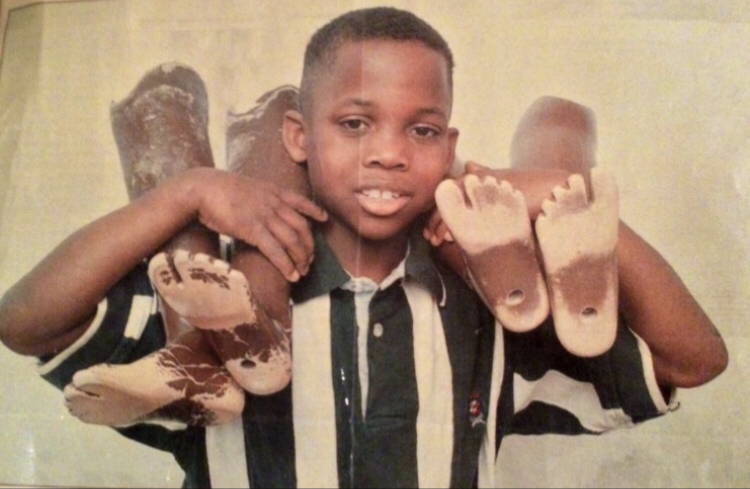
You have so much you want to accomplish in this life. Do you live your life as a sprint or a marathon?
A little bit of both. Sometimes it has to be a sprint but I try to understand that this is a continuous journey. You know how they say an overnight success takes ten years? I keep that in mind while I’m on this journey. I give it my all as if it is a sprint. But I understand that this will be a continuous marathon of grinding and sacrificing.
I heard somewhere you have to take the lifetime of the opportunity and the opportunity of the lifetime. For me, running is a lifetime of an opportunity but me qualifying for the Olympics is an opportunity of a lifetime.
What’s next after the Olympics?
I’m not sure! I Love LA, I love going on auditions. I just want to get out my story, and I think it’s important to tell the story of my life.
You are truly amazing. Thank you.
#LETLEEPERRUN
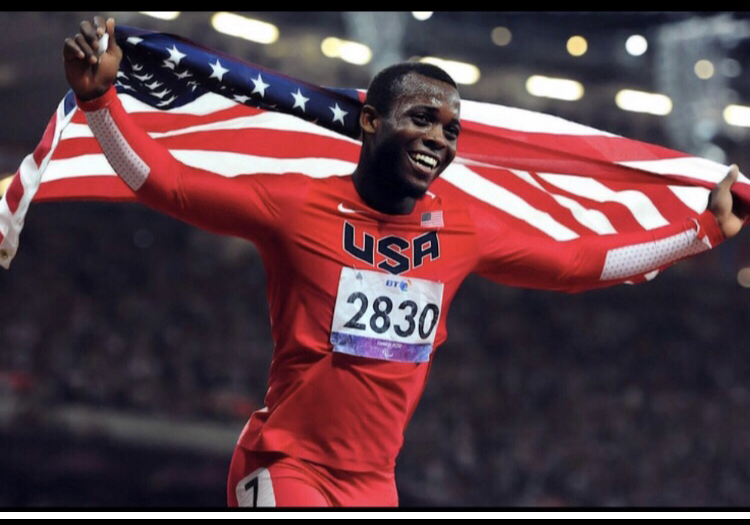
UPDATE
On October Blake Leeper was ruled ineligible for the Olympics and lost his appeal to use prosthetics legs.
He can challenge the ruling at the Swiss supreme court before the Olympics open in July 2021.
“I will never give up and will continue to do all I can to compete and be judged by standards that are non-discriminatory, in every way,” the 400-meter runner said.” – Blake Leeper (ESPN)
[adsenseyu2][adsenseyu3]
